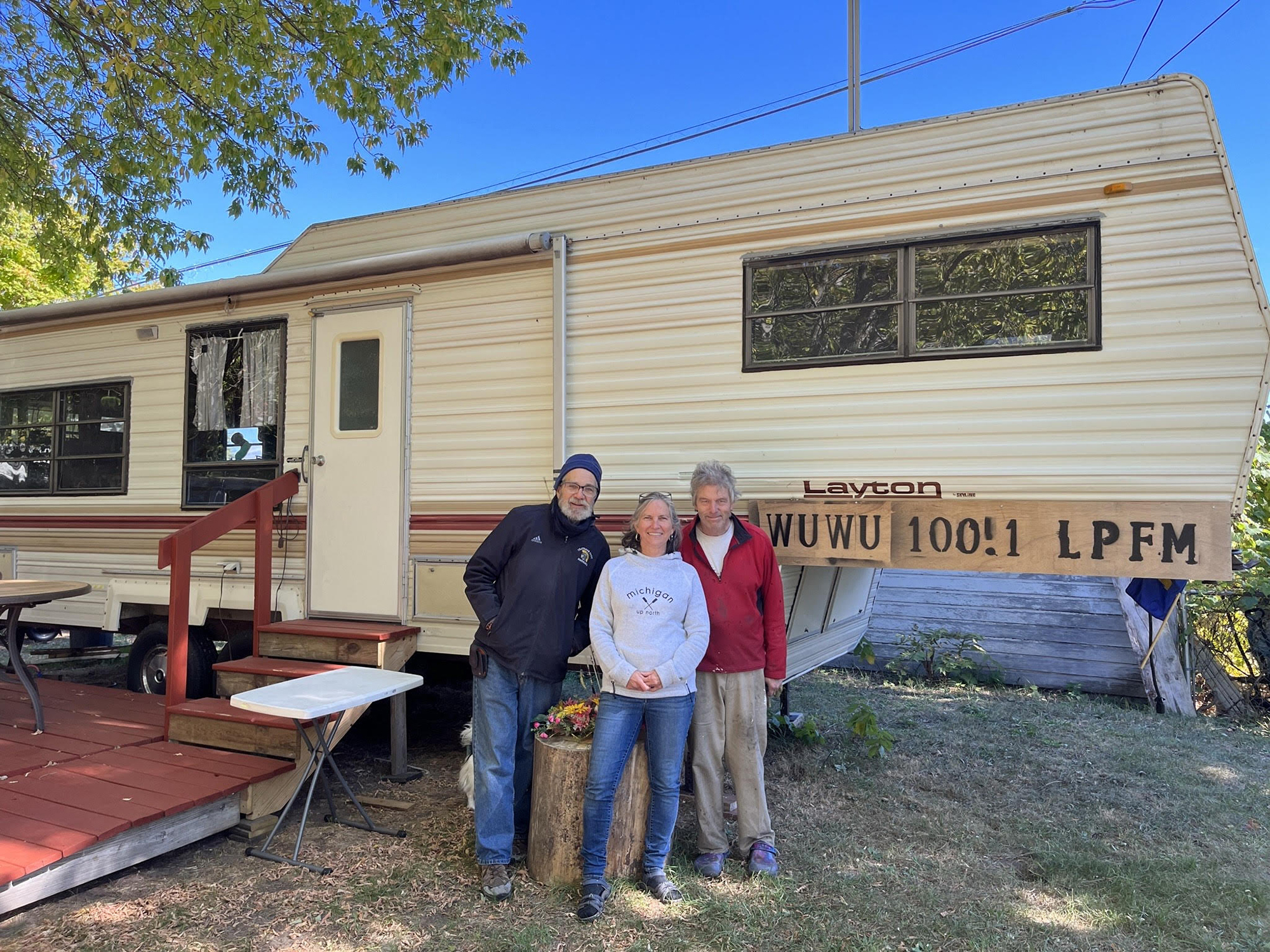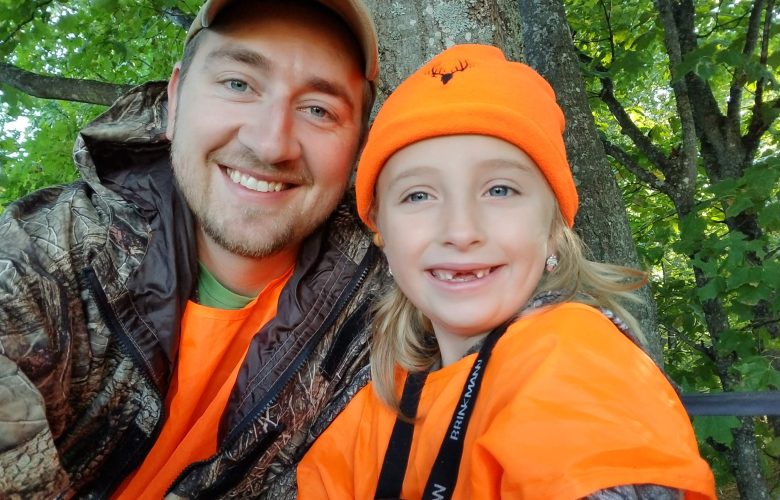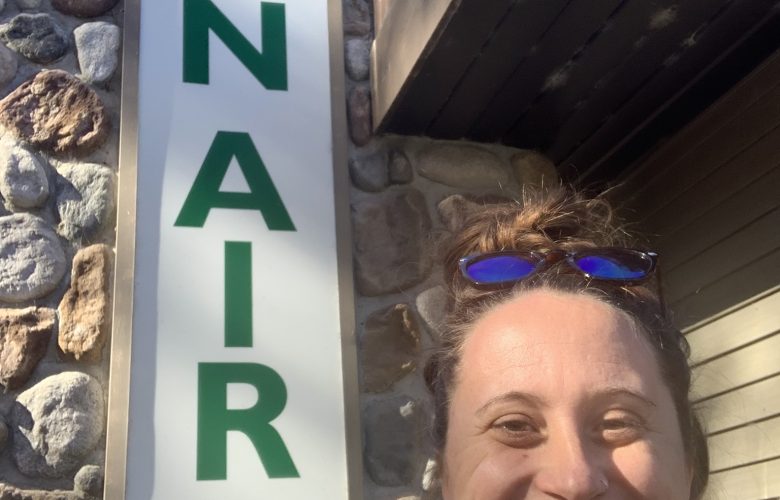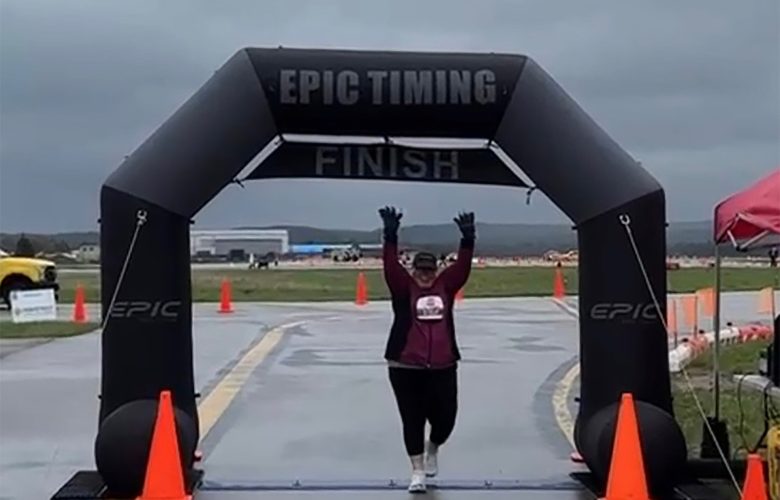Questions & Answers with community faces
Arlene Sweeting (57) grew up near Nassau Island, in the Bahamas. She graduated from Auburndale High School in Central Florida in 1985. She then attended the University of North Carolina – Chapel Hill and graduated in 1989 with a Bachelor of Arts degree in political science. Sweeting then earned her Master’s degree in education from James Madison University in Virginia in 1993. She taught middle school science in Florida from 1993 through 2002.
Meanwhile, David Beaton (67) grew up downstate and graduated from Milford High School in 1975. He then attended Michigan State University, where he earned a Bachelor of Arts degree in communications in 1981. He moved to Chicago and started a video production company with a friend, until he moved to Florida to help take care of his grandmother. He was married and had a child, and then he began teaching film at Manatee Community College in Bradenton, Florida.
That is where Beaton met Sweeting, who was a candidate for the Florida State House and was campaigning at a student event on campus. He then became her campaign manager, and after the campaign was over, the couple started Fogartyville Cafe, a coffee house in Bradenton where they held many events that the community could rally around.
In 2004, as a natural extension of the community work that they had been doing, the couple started a Low Power FM (LPFM) radio station called WSLR, which stood for “Why Sarasota Loves Radio.” They ran WSLR for more than 20 years, before they turned it over to new leadership in 2024, and it is still going strong. The transition took several years, but after the final goodbye, Sweeting and Beaton were ready for a new adventure.
Beaton’s parents had a small cabin in Canada, where the family would vacation during the summers; when his parents died, the cabin was sold, but Beaton and Sweeting wanted to continue to have a place to visit along the 45th parallel—they somewhat randomly found a foreclosure in Elberta in 2019. Beaton fell in love with the history of Elberta and founded the non-profit Elberta Labor Heritage Center in 2021.
After splitting their time between Florida and Northern Michigan for a few years, Sweeting and Beaton moved full time to Elberta in June 2024.
But they could not leave their radio roots behind.
“We learned in November 2023 that the [Federal Communications Commission, FCC] would be opening a new window for LPFM stations,” Sweeting explains. “We attempted to get other non-profits in Benzie County interested in applying for a license to do so, but when no one stepped up to the plate, we decided to apply for a license with the Elberta Labor Heritage Center.”
Upon receiving the construction permit from the FCC, they proceeded to set up a radio station in an old RV trailer—donated by retired Benzie County teacher Hank Crooks—in their backyard.
Instead of beds and a functioning kitchen, inside the RV are three microphones—with socks for dampeners—a sound board, CD players, a few laptop computers, and there was an extension cord running electricity from the house until recently. They were able to raise $1,500 in donations to have Consumers Energy run a separate electricity meter for the trailer.
The radio station, with call letters “WUWU,” is a 100-watt, low-power, non-commercial community radio station. Low-power radio—specifically Low Power FM (LPFM)—was created in 2000 to combat media consolidation and bring localism back to the radio dial.
After about 10 months of setting up the trailer, getting equipment, and lining up programming, WUWU 100.1 LPFM began broadcasting in October 2024, thanks to the hard work of a small group of dedicated volunteers.
Continuing with our interview series on impactful Benzie County characters, The Betsie Current caught up with Sweeting and Beaton as they were preparing for the week ahead.
The Betsie Current: What do you enjoy about running a local radio station? What do you think you are offering that is different from what is already out there?
Arlene Sweeting: More than audio outlets, volunteer-based community radio stations serve as cultural institutions in their communities, reflecting the unique concerns and passions of the people who live there. With a system based on openness and collaboration—and diverse programming, produced by volunteers and funded by listeners—community radio stations are cornerstones of participatory democracy, offering ordinary citizens the chance to exercise First Amendment rights in a mass medium and giving audiences the opportunity to directly support the programming that is of interest to them. WUWU Community Radio stands out from others as a one-of-its-kind resource for the Frankfort-Elberta area offering community-driven broadcasting and media production, as well as educational and civic offerings that inform and engage. As a non-commercial radio station, WUWU 100.1 LPFM is able to create content that commercial media simply can’t, with the tremendous pressure to cater their content to appeal to advertisers. This pressure can lead to a narrow focus on sensational or commercially viable content, rather than those that are truly newsworthy or of public interest. As a result, quality of journalism and access to diverse perspectives suffer, with important but less profitable content being sidelined. This dynamic can create a media landscape that prioritizes profit over substance, reducing the diversity and depth of information available to the public. Consequently, audiences may receive a skewed or incomplete picture of current events, potentially diminishing informed civic engagement and critical discourse. At WUWU, we are working to build a people-powered information network to ensure that residents have access to the information they need to make informed decisions. WUWU’s license is held by the non-profit Elberta Labor Heritage Center, and another of the unique things we do is capture oral histories from some of the older residents in our community. Our oral history interviews are available on the Elberta Labor Heritage Center website. We also archive all of our shows for two weeks on the website, in case you miss your favorite program. Together, WUWU and the Elberta Labor Heritage Center celebrate the creative, historic, and cultural vitality of the local community. I enjoy being able to entertain and inform the community through a diverse line-up of programming. I also enjoy being part of the larger movement for media justice and independence.
David Beaton: We’re doing people-powered media, where local folks get training on media and get to meet their neighbors. We are “a third place.” For those who haven’t heard of that concept before: your first place is home; and a second place might be your job, coaching football, or that thing you do that is for you; and third places are your community—local coffee shop, local brewery, local radio, etc. The local environment is strong here, and we hope to add to that strength. I enjoy listening to radio and meeting Benzie folks from all walks of life.
Current: What does a typical day of work look like for you?
Sweeting: It’s important to understand that WUWU is a volunteer effort. No one is getting paid for their work. We do the work because we believe in community radio and have seen the impact it can have on a community. Now that the radio station is broadcasting, the work involves outreach, training new programmers, hosting or filling in for shows when necessary, adding music to our digital library, dealing with technical issues, and grant writing. We will also be hosting events to help raise awareness of the station and build community—the first is our Democracy Film Series, which began in March and continues on the last Thursday of the month in both April and May. On weekdays, Dave and I start the morning with WUWU Radio and catch up with the news of the day at 8 a.m. with Democracy Now, an independent news hour, hosted by award-winning journalists Amy Goodman and Juan González, that is broadcast on more than 1,400 radio and television stations worldwide. We also try to turn into the WUWU Morning Show to hear from local voices. In addition to trying to build the Elberta Labor Heritage Center and WUWU, I still do limited consulting and grant-writing for the low-power community station that we founded in Sarasota. There’s always at least one dog walk scheduled, and, on most days, an opportunity to connect with community members in person, whether it be trivia at Stormcloud, a program at a local library, a potluck dinner, a biochar burn, etc.
Beaton: My typical day is loading more music files into WUWU’s library; we currently have 4,000-plus songs of various genres. And I make sure all tech stuff works, including getting heat on in the trailer. We look for events and gatherings that we should include in our upcoming event lists, and we record PSAs [public service announcements] for non-profit organizations. We try to attend a variety of local events to let folks know they have this resource—WUWU Community Radio.
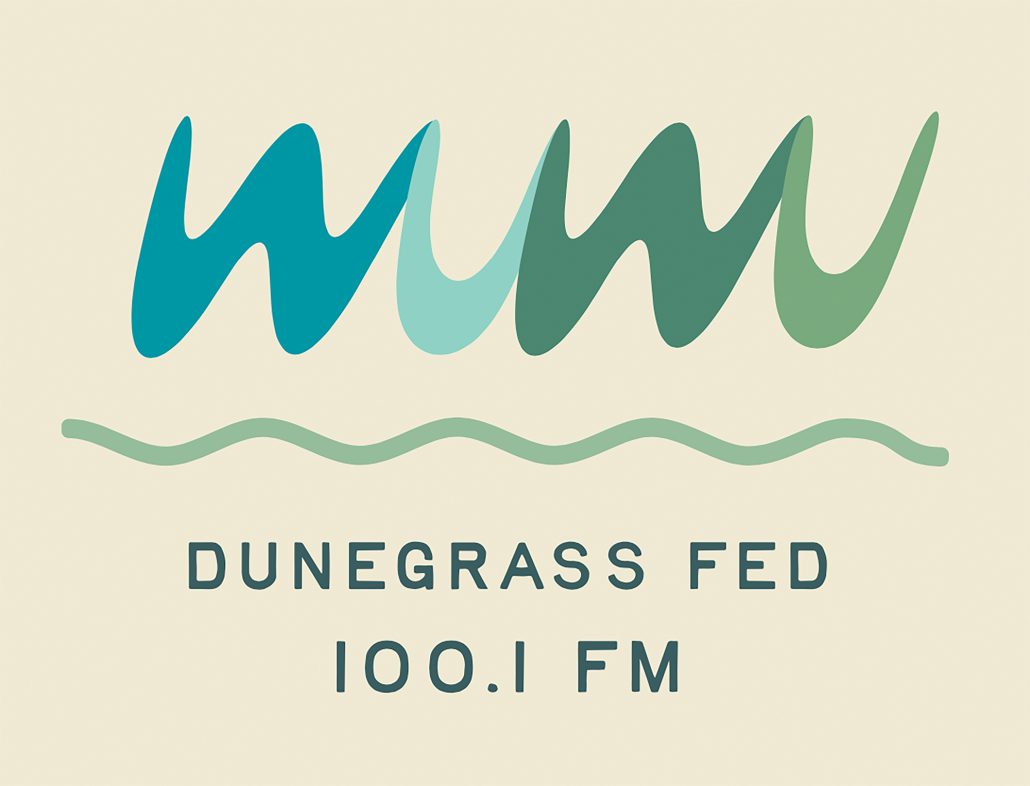
Current: Where does the name WUWU come from? Who designed your logo?
Sweeting: You get to choose your call letters, based on availability. We came up with a number of possibilities that would have FE—for Frankfort and Elberta—in the name, but they were all taken. Dave proposed “WUWU.” It’s actually funny, because the students involved with our Florida station wanted us to use the call letters “WUWU,” but we felt it would not go over well in the community and might be too hard to pronounce. He sold it to us, though, by linking it to the train and car ferry history of Elberta. Now, we keep a train whistle in the studio, so that we can punctuate our Station ID with a “woo-woo” from the whistle. Last summer, Mary Welcome was staying at the Sawbill Surf Club, which is an artist residency in Elberta, located across the street from our house, and we connected with her, and she designed the WUWU logo for us. She put a lot of thought into the colors and the symbols and the meaning; she gave a full presentation to our board and programmers.
Current: How have you seen your work grow and change? How do you hope that it will continue to grow? What is next?
Sweeting: The station’s license is held by the Elberta Labor Heritage Center, a non-profit started in 2021 to help preserve, share, and animate the history and heritage of Elberta and its people. When we discovered Elberta and bought a home in the fall of 2019, Dave became immersed in the history of the area—the railroads and the car ferries. The house we bought was the old railroad boarding house, used by the railroads until the 1980s. Meeting our neighbors, we realized that many of the folks with first-hand knowledge of these industries might not be with us much longer, so one of our goals was to try to capture oral histories from some of the elders in the community. Carol and Mark Carlin, the owners of The Elberta Mercantile, host the WUWU Morning Show from 9 to 11 a.m. on Thursday mornings, and they have been focusing on getting some of these folks on the air, so that we can record their stories. The Thomas Sisters were our first oral history; their father owned the Thomas Grocery in Elberta. They shared their memories of growing up in the area. You can listen to that interview and other oral histories on our website. Additionally, we hope to develop a self-guided walking tour of Elberta and are discussing having an historical mural painted on one of our downtown buildings. We’d also love to have a space where we could curate local history exhibits. In terms of the radio station, we’d love to have more local voices on the air. We’d also like to involve students in the radio station—producing music shows or school news segments; reading their poetry or short stories; conducting interviews; etc. Once we build our volunteer base and raise some funds for equipment, we could also broadcast live from community events.
Beaton: It is much easier to work in a heated trailer, so that was a win, when we got electricity hooked up. Before that, we were running off an extension cord from our house, which limited the amount of power that we could use. In February, we finally got a separate electric hook-up for the trailer, which allowed us to put a larger heater in the space. Next up is our own gatherings of folks who understand that radio is a great tool for building a safe and fearless community.
Current: Who are some of the hosts, and what are their radio shows? What kinds of things can people expect to hear from your radio station?
Sweeting: Right now, we have local hosts like Paul May, Mike Tarkington, Sarah Anderson, Pearce Decker, Carol and Mark Carlin—in addition to Dave and myself filling in—on weekday mornings from 9 to 11 a.m. The show is a mix of interviews with locals, talking about local events, and some music. Additionally, Keelee Beaudet, Matt Nahnsen, Dan Haremski, and Sue Oseland are hosting music shows. Maristela Zell and Ellie Harold are hosting talk shows. Most of our afternoon music is from our digital library that Dave has been building—we’ve segmented it into Folk/Americana from 11 a.m. to 1 p.m.; Rock/Blues from 2 to 4 p.m.; and Pop/Oldies from 4 to 6 p.m. We play from our Jazz collection overnight from 9 p.m. to 6 a.m. For the remaining hours and the weekends, we are playing syndicated programs from other community stations. You’ll hear Bluegrass, Country, Punk, Soul, Synthpop, Electronic music, and more, depending on when you tune in. We are really interested in getting community feedback on what type of programming people would like to hear, and our program hosts always like to receive texts during their shows, so feel free to make requests or ask questions. And as I mentioned, we air Democracy Now on weekdays at 8 a.m. Other public affairs programs air weekdays at 6 p.m. and from 8 to 10 a.m. on weekend mornings. Programs are archived and accessible on our website for two weeks after broadcast.
Beaton: You can get us on your car radio, house stereo, or our website for streaming, so tune in by whatever mode works best for you. As for what people can expect from us—the unexpected can be expected. It is a tool of communication. Ask yourself, do you want to use it?
Current: What kinds of things do you do for fun, when you are not working? What other things are you involved with? How did you get involved with them, and why are you passionate about these causes?
Sweeting: We’ve been working on renovating and repairing our house in Elberta, and we also have a piece of property in Onekama that we are working to improve. We love hiking and canoeing and have been exploring the multiple trails with our two small dogs, Bella and Pee Wee. We’re getting used to the climate, and we’re looking forward to planting a garden this spring. Over the years, I have been involved in leadership with environmental organizations, peace and justice organizations, and voting rights organizations in Florida. This is our first full year in Northern Michigan, and I’ve been taking time getting to know the community before jumping in too deeply in involvement—outside of our efforts in Elberta. I have started a Rural Readiness Team in Elberta, and we are planning some events/activities to highlight what is special about Elberta.
Beaton: I’m interested in grassroots democracy, for we have a responsibility to fairness, justice, and transparency in this system, if we want to keep this ship afloat. I’m a Gilmore Township Trustee—learning about cemeteries these days.
Current: How have you seen Northern Michigan change since you first came here to visit? What are your hopes for the area in the future?
Sweeting: We’ve been coming up here to spend time since the summer of 2020; June will mark our first year of living up here full time. We were thrilled with the purchase of the Elberta waterfront property by the Grand Traverse Regional Land Conservancy, and we look forward to being involved in envisioning plans for the nine-acre parcel that is slated for community-aligned redevelopment. In the future, we hope to be able to establish a physical space to house the Elberta Labor Heritage Center, so that we can host exhibitions and presentations designed to celebrate the history of the area.
Beaton: Slow, smart growth with community input. I hope WUWU 100.1 can help with that. Already we have the mayor of Frankfort and a Village of Elberta councilperson calling in every other week with updates for our listeners, and we are looking for representatives from other local government entities to do regular call-ins with us, to keep folks informed.
Current: What are the biggest challenges and rewards of living/working in Benzie County, and in Northern Michigan, in general? What is the best or most rewarding part of your job?
Sweeting: We appreciate the community here and are enjoying getting to know our neighbors. We love being close to nature, being able to walk through the dunes to the beach. Having lived in Florida for more than 30 years, I do appreciate the seasonal changes in Northern Michigan. I dipped my toe into winter sports this season and look forward to being better prepared to enjoy them next season.
Beaton: Challenges—“long johns.” Getting them on and off. And finding resale snow pants. I love the music and the randomness of the music selection. And the winter potlucks.
Current: What could Northern Michigan do to attract more talented people to this area? What else does Benzie County need?
Sweeting: I see people in Benzie County working to create the community they want to live in. People are growing their own food, making their own clothes, preserving natural resources, helping their neighbors, funding important community resources, like The Garden Theater, the Oliver Art Center, and Grow Benzie. I think that’s what we need more of—community conversations about the type of community and world that we want to live in and what we need to do to create it. Here in Elberta, we have an important opportunity to do some of that visioning, thanks to the purchase of the waterfront property by the Grand Traverse Regional Land Conservancy.
Beaton: I think it’s great the way it is. There are many great talents here, old and young. Sometimes, patience is all you need.
Current: What are your favorite local events and activities? Any favorite dining, recreation, hiking spots?
Sweeting: Love the Elberta Dunes and walking the beach; swimming when it’s warm enough. We love history, so we enjoy attending the Benzonia Academy Lectures and visiting the Benzie Area Historical Museum.
Beaton: Enjoy St. Ambrose’s outdoor music events. Looking forward to Asian cuisine coming to downtown Frankfort and the new MT Plate coming to Arcadia.
Current: What does your perfect spring day look like in Benzie County? How would you spend it?
Sweeting: Canoeing the Betsie River.
Beaton: Hit a new trail or river with a picnic lunch, or biking the Betsie Valley Trail to Beulah.
Want to listen? Turn to 100.1 FM on your radio dial, or stream live at WUWURadio.org online. Learn more at ElbertaLaborHeritageCenter.org and access past programs at ElbertaHeritageCenter.org/archive/ online. Email WUWUWLPFM@gmail.com with the subject “Subscribe” if you would like to be added to their email list. Call 231-774-6360 to leave a message; text the DJs at 231-774-6360 with your music requests. Email or call if you are interested in learning how to host your own radio show, or if you are looking to donate funds to support this community radio station.
Mikva! Democracy Is A Verb plays on Thursday, April 24, followed by a panel discussion with Brian McCall, Ian Evans, and Aubrey Ann Parker. Punch 9 for Harold Washington plays on Thursday, May 29, followed by a talk-back with executive producer Bob Hercules. Both films are free and begin at 7 p.m. at The Garden Theater in downtown Frankfort.

